新目标八上Unit 1 Where did you go on vacation?第一课时教案
八年级英语上册Unit1Wheredidyougoonvacation讲义+习题(新版)人教新目标版
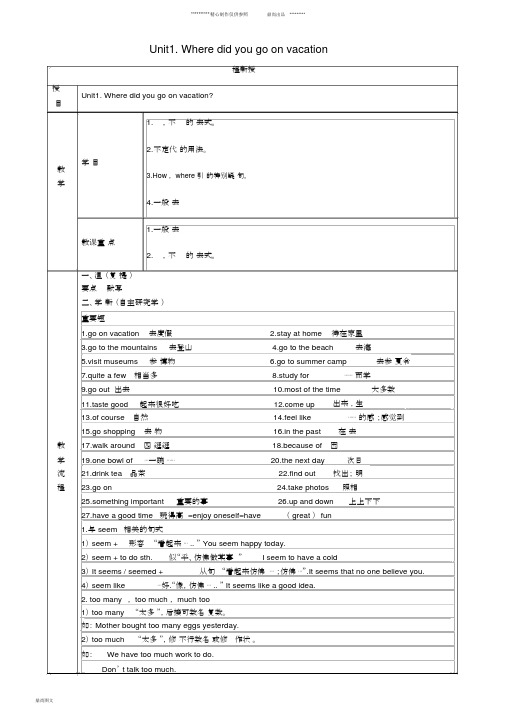
Unit1. Where did you go on vacation程新授授Unit1. Where did you go on vacation?目1.,不的去式。
2.不定代的用法。
学目教3.How , where 引的特别疑句。
学4.一般去1.一般去教课重点2.,不的去式。
一、温(复提)要点默写二、学新(自主研究学)重要短1.go on vacation去度假2.stay at home待在家里3.go to the mountains去登山4.go to the beach去海5.visit museums参博物6.go to summer camp去参夏令7.quite a few相当多8.study for⋯⋯ 而学9.go out 出去10.most of the time大多数11.taste good起来很好吃e up出来 ,生13.of course自然14.feel like⋯⋯的感;感觉到15.go shopping去物16.in the past在去教17.walk around四逛逛18.because of因学19.one bowl of⋯一碗⋯⋯20.the next day次日流21.drink tea品茶22.find out找出;明程23.go on24.take photos照相25.something important重要的事26.up and down上上下下27.have a good time 玩得高 =enjoy oneself=have( great ) fun1.与 seem相关的句式1) seem +形容“看起来⋯ .. ” You seem happy today.2) seem + to do sth.似“乎、仿佛做某事”I seem to have a cold3) It seems / seemed +从句“看起来仿佛⋯;仿佛⋯”.It seems that no one believe you.4) seem like⋯好.“像,仿佛⋯ .. ” It seems like a good idea.2. too many, too much , much too1) too many“太多”,后接可数名复数。
人教版新目标八年级上册Unit 1 Where did you go on vacation_教学设计
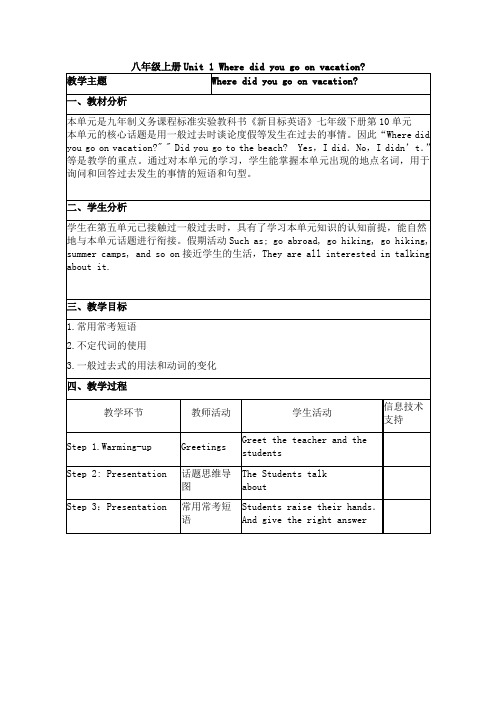
1.常用常考短语
2.不定代词的使用
3.一般过去式的用法和动词的变化
四、教学过程
教学环节
教师活动
学生活动
信息技术支持
Step 1.Warming-up
Greetings
Greet the teacher and the students
Step 2:Presentation
话题思维导图
The Students talk
八年级上册Unit 1Where did you go on vacation?
教学主题
Where did you go on vacation?
一、教材分析
本单元是九年制义务课程标准实验教科书《新目标英语》七年级下册第10单元
本单元的核心话题是用一般过去时谈论度假等发生在过去的事情。因此“Where did you go on vacation?" " Did you go to the beach? Yes,I did.No,I didn’t.”等是教学的重点。通过对本单元的学习,学生能掌握本单元出现的地点名词,用于询问和回答过去发生的事情的短语和句型。
二、学生分析
学生在第五单元已接触过一般过去时,具有了学习本单元知识的认知前提,能自然地与本单元话题进行衔接。假期活动Such as; go abroad, go hiking, go hiking, summer camps, and so on接近学生的生活,They are all interested in talking about it.
小组记忆
一般过去时的谓语构成
Step7: Summary
查缺补漏
学生自己总结
Step9: Homework
人教新目标八年级英语上册Unit 1 Where did you go on vacation知识点归纳
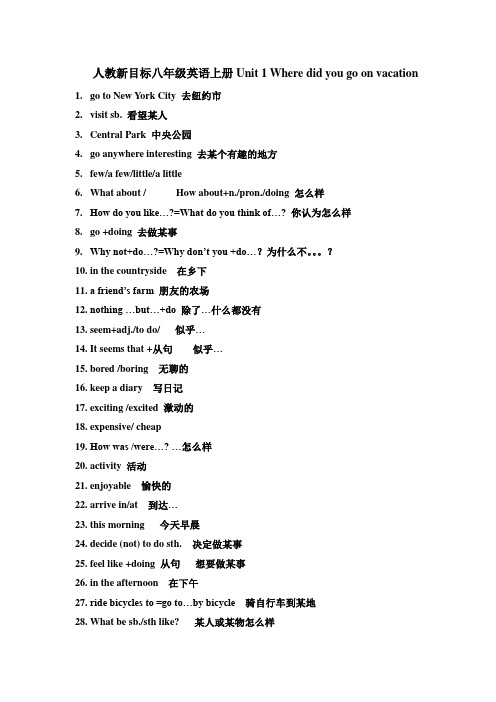
人教新目标八年级英语上册Unit 1 Where did you go on vacation1.go to New York City 去纽约市2.visit sb. 看望某人3.Central Park 中央公园4.go anywhere interesting 去某个有趣的地方5.few/a few/little/a little6.What about / How about+n./pron./doing 怎么样7.How do you like…?=What do you think of…? 你认为怎么样8.go +doing 去做某事9.Why not+do…?=Why don’t you +do…?为什么不。
?10.in the countryside 在乡下11.a friend’s farm 朋友的农场12.nothing …but…+do 除了…什么都没有13.seem+adj./to do/ 似乎…14.It seems that +从句似乎…15.bored /boring 无聊的16.keep a diary 写日记17.exciting /excited 激动的18.expensive/ cheap19.How was /were…? …怎么样20.activity 活动21.enjoyable 愉快的22.arrive in/at 到达…23.this morning 今天早晨24.decide (not) to do sth. 决定做某事25.feel like +doing 从句想要做某事26.in the afternoon 在下午27.ride bicycles to =go to…by bicycle 骑自行车到某地28.What be sb./sth like? 某人或某物怎么样29.enjoy doing sth 喜欢做某事30.enjoy oneself 玩的高兴31.walk around 到处走32.make a (big) difference 使结果不同33.walk to 走到34.over =more than 多与,超过35.wait forsb./sth. 等候某人或某物36.because/ because of 因为37.below 在下面38.enough +n. 足够的…39.adj./adv.+enough 足够(地)……40.not …enough to do /so…that /too … to41.one bowl of rice 一碗米饭42.taste +adj. 吃起来…43.have a good time /enjoy oneself /have fun 玩的高兴,过得愉快44.go paragliding 去做滑翔伞运动45.the next day 第二天46.as …as 和…相同47.not as/so…as 和…不一样48.forget to do sth 忘记(去)做某事49.forget doing 忘记做过某事50.That’s not at all. 并不只是这些51.along the way 沿途52.one hour later 一小时后53.stop to do sth. 停下来去做某事54.stop doing sth. 停止做某事55.another +n. 另一个…56.another+数字+名词复数又…,在…57.the top of the hill 山顶58.Tian’an Men Square 天安门广场59.the Palace Museum 故宫博物院60.a Beijing Hutong 北京胡同61.something important 一些重要的事情62.excellent 极好的,优秀的63.do/does /did+动词原形确实…64.home cooking 家常做法st August 去年八月66.on our school trip 在我们的旅行中67.sb /sth with sth 具有…的人或物68.after some time 在…后69.some time later 在…后70.look at 看…71.find out /find /look for72.tired / tiring 累的73.so…that 如此…以至于74.tell sb to do sth 告诉某人做某事75.keep doing sth 一直做某事,坚持做某事76.go on 继续77.up and down 上上下下78.in excitement 激动地e up 出现,发生80.go on vacation 去度假81.stay at home 呆在家82.go to the mountains 去爬山83.go to the beach 去海滩84.visit museums参观博物馆85.quite a few 相当多86.study for tests 为考试学习87.go out 出去88.most of the time大部分时间89.of course 当然90.go shopping 去购物91.in the past 再过去92.take photos 拍照93.go to summer camp 去参加夏令营94.diskike doing sth 不喜欢做某事95.What (a/an)+adj.+n..+主语+谓语!How + adj/adv + 主语+谓语!。
初二英语上册(人教新目标)Unit1Wheredidyougoonvacation_知识点总结
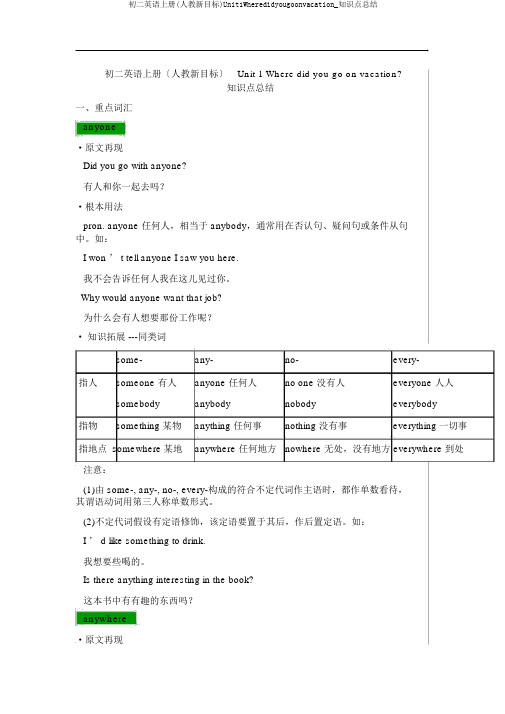
初二英语上册〔人教新目标〕Unit 1 Where did you go on vacation?知识点总结一、重点词汇anyone·原文再现Did you go with anyone?有人和你一起去吗?·根本用法pron. anyone 任何人,相当于 anybody,通常用在否认句、疑问句或条件从句中。
如:I won ’ t tell anyone I saw you here.我不会告诉任何人我在这儿见过你。
Why would anyone want that job?为什么会有人想要那份工作呢?·知识拓展 ---同类词some-any-no-every-指人someone 有人anyone 任何人no one 没有人everyone 人人somebody anybody nobody everybody指物something 某物anything 任何事nothing 没有事everything 一切事指地点 somewhere某地anywhere 任何地方nowhere 无处,没有地方 everywhere 到处注意:(1)由 some-, any-, no-, every-构成的符合不定代词作主语时,都作单数看待,其谓语动词用第三人称单数形式。
(2)不定代词假设有定语修饰,该定语要置于其后,作后置定语。
如:I ’ d like something to drink.我想要些喝的。
Is there anything interesting in the book?这本书中有有趣的东西吗?anywhere·原文再现Oh,did you go anywhere interesting?哦,你去过某个有趣的地方吗?·根本用法adv./pron. anywhere 什么地方,任何地方,常用在否认句或疑问句中。
肯定句中常用 somewhere,其修饰词也常常放在其后面。
八年级英语上册Unit1Wheredidyougoonvacation教材详解(新版)人教新目标版

Unit 1 Where did you go on vacation?第一单元主重点:①复习一般过去时②复合不定代词的用法③反身代词的用法④系动词的用法⑤动词后的to do和doing的差异⑥e d 形容词和 ing 形容词的差异⑦“近义词”的差异⑧本单元中的主谓一致现象⑨动词过去式的组成及不规则动词表⑩用同义短语变换同义句时谓语动词形式一致性的培育。
⑾叹息句的构造和连词的选择。
一、词组、短语:1、 go on vacation 去度假2、 stay at home 呆在家,3、 go to the mountains 上山/进山4、 go to the beach 到海边去5、 visit museums 观光博物馆,6、 go to summer camp 去夏令营7、 quite a few 相当多,8、 study for 为学习,9、 go out 出去,10、 most of the time 大多半时间 / 绝大多时间,11、 taste good 尝起来滋味好,12、 have a good time 玩的高兴,13、 of course 自然能够,14、 feel like 感觉像 / 想要 ,15、 go shopping 购物,16、 in the past 在过去,17、 walk around 绕走,18、 too many 太多(可数名词前方),19、 because of 因为,20、 one bowl of 一碗 ,21、 find out 查出来/发现,22、 go on 连续,23、 take photos 照相,24、 something important 重要的事情,25、 up and down 上上下下,26、 come up 出来二、重要句子(语法):Where did you go on vacation? 你到哪里去度假了?I went to New York City. 我去了纽约城Did you go out with anyone? 你出去带人吗?No, No one was here. Everyone was on vacation. 不,没有人在这儿。
最新人教新目标英语八年级上册 Unit 1 Where did you go on vacation?单元知识归纳

Unit 1 Where did you go on vacation?单元知识目标突破词汇SectionAanyone pron.任何人→P3SectionBfeel like给……的感觉;感受到→P10quite a few 相当多;不少→P3building n.建筑物;房子→P10wonder v. 想知道;琢磨→P11most adj.,adv. &pron. 最多;大多数→P4difference n.差别;差异→P11wait v.&n. 等待;等候→P12 seem v. 好像;似乎;看来→P4because of 因为→P12bored adj. 厌倦的;烦闷的→P5below prep.&adv. 在……下面;到……下面→P13SectionBactivity n. 活动→P9enough adj. 足够的;充足的;充分的→P13 decide v. 决定;选定→P9try v.& n. 尝试;设法;努力→P9dislike v.&n.不喜爱;厌恶→P14把握句型1.I felt like I was a bird.我感觉像是一只鸟。
feel like后接的是宾语从句。
2.I wonder what life was likehere in the past.我很想知道过去这儿的生活是什么样的。
注意wonder的用法。
3.What a difference a day makes!一天的差别有多大!注意感叹句。
4.And because of the badweather,we couldn't seeanything below.因为这恶劣天气,我们看不到下面的任何景色。
注意because of的运用。
熟悉语法学习不定代词的用法。
规则动词和不规则动词的过去式。
学会交际学会询问度假情况的交际用语。
写作练笔记叙假期发生的事情。
课文翻译Section A 2dRick:Hi,Helen. Long time no see.Helen:Hi,Rick. Yes,I was on vacation last month.Rick:Oh,did you go anywhere interesting?Helen:Yes,I went to Guizhou with my family.Rick:Wow!Did you see Huangguoshu Waterfall?Helen:Yes,I did. It was wonderful!①We took quite a few photos there. What about you?Did you do anything special last month?Rick:Not really.②I just stayed at home most of the time to read and relax.,里克:你好,海伦。
人教新目标八年级上册英语《Unit 1 Where did you go on vacation?》

人教新目标八年级上册英语《Unit 1 Where did you go on vacation?》Section A_教学设计1一. 教材分析人教新目标八年级上册英语《Unit 1 Where did you go on vacation?》Section A,主要介绍了假期旅游的话题。
本节课通过引入旅游的话题,让学生学习一般过去时态的疑问句和回答。
教材内容丰富,插图生动有趣,有利于激发学生的学习兴趣。
本节课的主要语言点是一般过去时态的疑问句和回答,以及相关的旅游词汇。
二. 学情分析八年级的学生已经学习了英语一段时间,对英语有了一定的了解和掌握。
他们好奇心强,喜欢探索新事物,但同时也有可能对英语学习产生疲劳感。
因此,在教学过程中,需要充分调动学生的积极性,激发他们的学习兴趣。
学生的英语水平参差不齐,因此需要针对不同水平的学生进行分层教学。
三. 教学目标1.知识目标:学生能够掌握一般过去时态的疑问句和回答,以及相关的旅游词汇。
2.能力目标:学生能够用英语询问和描述假期旅游的经历。
3.情感目标:通过本节课的学习,学生能够培养对旅游的兴趣,增强对英语学习的热情。
四. 教学重难点1.重点:一般过去时态的疑问句和回答,以及相关的旅游词汇。
2.难点:一般过去时态的疑问句和回答的运用,以及旅游词汇的准确表达。
五. 教学方法1.任务型教学法:通过设定各种旅游相关的任务,让学生在完成任务的过程中学习和运用语言。
2.情境教学法:创设各种旅游情境,让学生在真实的情境中学习英语。
3.小组合作学习:通过小组讨论和合作,提高学生的参与度和积极性。
六. 教学准备1.教师准备:提前准备相关的旅游图片、视频和旅游经历的故事,以及旅游词汇的卡片。
2.学生准备:学生需要提前预习教材,了解本节课的学习内容。
七. 教学过程1.导入(5分钟)通过向学生展示各种旅游图片,引导学生谈论自己的旅游经历,激发学生的学习兴趣。
教师可以提问:“Where did you go on vacation?”,让学生用英语回答。
人教新目标八年级上册英语《Unit 1 Where did you go on vacation?》

人教新目标八年级上册英语《Unit 1 Where did you go on vacation?》Section B_教案1一. 教材分析本课是新人教新目标八年级上册英语《Unit 1 Where did you go on vacation?》Section B。
本节课主要讲述了人们在不同假期的旅行地点和活动。
通过本节课的学习,学生能够掌握一般过去时的疑问句和回答,以及一些旅行相关的词汇。
本节课的内容与学生的日常生活紧密相连,有利于激发学生的学习兴趣和积极性。
二. 学情分析八年级的学生已经掌握了基本的英语语法和词汇,对一般过去时有所了解,但运用起来还不够熟练。
学生的学习兴趣较高,但对一些旅行地点和活动的词汇可能还不够熟悉。
因此,在教学过程中,需要注重词汇的讲解和操练,同时引导学生运用一般过去时进行交流。
三. 教学目标1.知识目标:–能够听懂、说出一般过去时的疑问句和回答。
–掌握与旅行地点和活动相关的词汇。
2.能力目标:–能够用一般过去时描述自己的假期经历。
–能够用英语进行简单的旅行计划交流。
3.情感目标:–激发学生对旅行的兴趣和好奇心。
–培养学生用英语进行交流的能力。
四. 教学重难点•一般过去时的疑问句和回答。
•与旅行地点和活动相关的词汇。
•一般过去时的运用。
•旅行地点和活动的词汇。
五. 教学方法1.情境教学法:通过设定旅行情境,引导学生进行实际的语言运用。
2.交际法:通过小组讨论和角色扮演,培养学生用英语进行交流的能力。
3.任务型教学法:通过完成旅行计划的任务,提高学生的综合语言运用能力。
六. 教学准备1.教学PPT:包含本节课的主要内容、词汇和练习。
2.旅行相关图片:用于展示和讲解旅行地点和活动。
3.旅行计划模板:用于学生完成旅行计划任务。
七. 教学过程1.导入(5分钟)利用旅行相关的图片和歌曲,引导学生谈论旅行的话题,激发学生的兴趣。
教师提问:“Where did you go on vacation?”,学生回答并分享自己的旅行经历。
最新人教新目标英语八年级上册 Unit 1 Where did you go on vacation?教案2
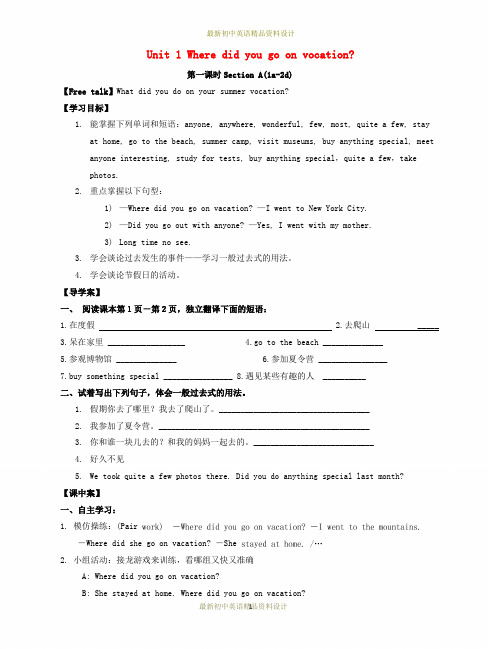
Unit 1 Where did you go on vocation?第一课时Section A(1a-2d)【Free talk】What did you do on your summer vocation?【学习目标】1.能掌握下列单词和短语:anyone, anywhere, wonderful, few, most, quite a few, stayat home, go to the beach, summer camp, visit museums, buy anything special, meetanyone interesting, study for tests, buy anything special,quite a few,takephotos.2.重点掌握以下句型:1)—Where did you go on vacation? —I went to New York City.2)—Did you go out with anyone? —Yes, I went with my mother.3)Long time no see.3.学会谈论过去发生的事件——学习一般过去式的用法。
4.学会谈论节假日的活动。
【导学案】一、阅读课本第1页-第2页,独立翻译下面的短语:1.在度假2.去爬山 _____3.呆在家里 __________________4.go to the beach ______________5.参观博物馆 ______________6.参加夏令营 ________________7.buy something special ________________ 8.遇见某些有趣的人 __________二、试着写出下列句子,体会一般过去式的用法。
1.假期你去了哪里?我去了爬山了。
___________________________________2.我参加了夏令营。
人教新目标八年级英语上册Unit 1 Where did you go on vacation?知识点归纳

人教新目标八年级英语上册Unit 1 Where did you go on vacation?知识点归纳第1课时 Section A(1a2d)anyone pron.任何人。
相当于anybodyanything pron.任何东西,任何事物。
常用于否定句或疑问句中anywhere adv. 在任何地方。
相当于anyplacewonderful adj. 精彩的,绝妙的。
其同义词有great, nice, excellent等few adj. & pron. 不多,很少。
用来修饰或指代复数可数名词,表示否定【拓展】(1)anyone的相关用法·anyone表示“某人”,常用于否定句、疑问句及条件句中。
如:He will not tell anyone, the secret will die with him. 他不会告诉任何人,这个秘密将与他一起进入坟墓。
·anyone用作主语,谓语动词用单数。
若需用代词代替,可用单数he, him 或复数they, them。
如:Anyone who likes this film can go and see it this evening. 凡是想看这部电影的人今晚都可以去看。
If anyone comes, please ask him (them) to wait for a moment. 如果有人来,请让他(他们)稍等。
·anyone被形容词修饰时,形容词应置于其后。
如:Do you know anyone famous in this field? 你认识这个领域的名人吗?(2)anything为不定代词,后面可接形容词,如special, wonderful, interesting 等。
当形容词修饰不定代词时,要将形容词放在不定代词的后面。
符合此用法的不定代词还有something, nothing, somebody, anybody,nobody, someone, anyone等。
最新人教新目标版中学八年级英语上册 Unit 1 Where did you go on vacation?教案
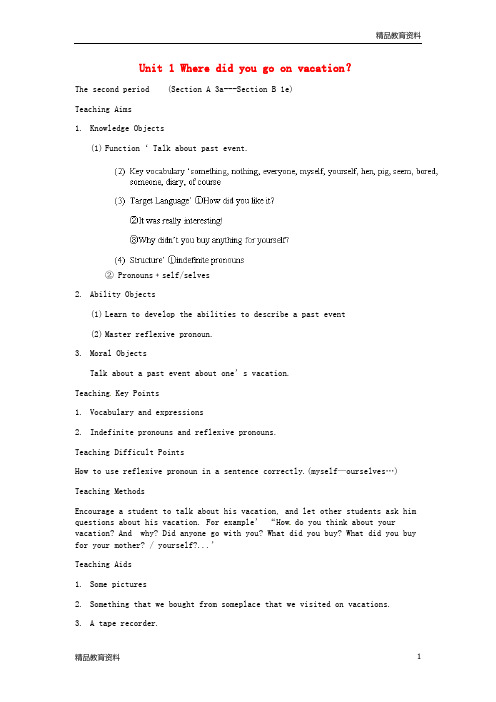
Unit 1 Where did you go on vacation?The second period (Section A 3a---Section B 1e)Teaching Aims1.Knowledge Objects(1)Function‘ Talk about past event.② Pronouns﹢self/selves2.Ability Objects(1)Learn to develop the abilities to describe a past event(2)Master reflexive pronoun.3.Moral ObjectsTalk about a past event about one’s vacation.Teaching Key Points1.Vocabulary and expressions2.Indefinite pronouns and reflexive pronouns.Teaching Difficult PointsHow to use reflexive pronoun in a sentence correctly.(myself—ourselves…)Teaching MethodsEncourage a student to talk about his vacation, and let other students ask him questions about his vacation. For example’ “How do you think about your vacation? And why? Did anyone go with you? What did you buy? What did you buy for your mother? / yourself?...’Teaching Aids1.Some pictures2.Something that we bought from someplace that we visited on vacations.3. A tape recorder.Teaching ProceduresStep1 GreetingT’ Good morning class!S’ Good morning teacher!T’ I like traveling. This is a picture I took on last vacation. Can you tell me where I went?S1’ Beijing.T’ Great! Did you go anywhere on your vacation?S2’ I went to…S’ How did you like it? Now who can ask him questions just like me?S3’ What did you buy?S2’ I didn’t bu y anything there.S4’Why?S2’ I didn’t like anything there.S5’ How was the food?S2’ It was …Objects’ Review the past tense.Step2 PresentationRead the new words ‘nothing, everyone, myself, yourself, hen ,pig, seem, bored, someone, diary, of course’. T hen ask some students to read them, and correct the wrong pronunciations.Step3 3aStep4 PresentationLearn reflexive pronounsGet the students to learn some reflexive pron ouns and write them on t heir notebooks.Objects’ Learn reflexive pronounsAttenti on’ Give more phrases.Step5 3bFill in the blanks with the words in the box in 3b.The teacher should ask students to pay attention to indefinite pronouns, especially anything and everythingStep6 3cAsk students to finish 3c with their partners.( ‘keep a diary ‘ means write diary down)Step71a,1bThese are adjective words. The teacher should teach the meanings of each word. It is best for every student to make a sentence with each word. Then find the words of the opposite meanings.Ask stu dents to write commendatory words of 1a on the left column, and write the derogatory words on the right.Step8 1cFirst, let students read the questions. Then play the recording the first time, then play it the second time. This time ask students to write the answers on the books.Have four students share their answers.Step9 1dListen again and fill in the blanks.Pay attention to the key words ’vacation, park, people, food, stores.’Step10 1eFirst, find some s tudents to give us a report about his/her vacation. Then encourage other students to ask q uestions with these words’ wher e, what, how, did, when, why, and so on.Step11 SummaryIn this class, we learned indefinite pronouns and reflexive pronouns.Step12 HomeworkWrite an article about your vacation. What did you do during your vacation? Did you like your vacation? Why?Blackboard DesignU nit1 Where did you go on vacation?The Second Period (Section A 3a—SectionB 1e)精品教育资料delicious terriblegreat expensiveexciting boringcheapReflexive pronoun’your—yourself—yourselvesmy—myself—our—ourselveshim—himself—themselvesher—herself。
新目标八年级上册英语第一单元Unit1 Where did you go on vacation知识点归纳
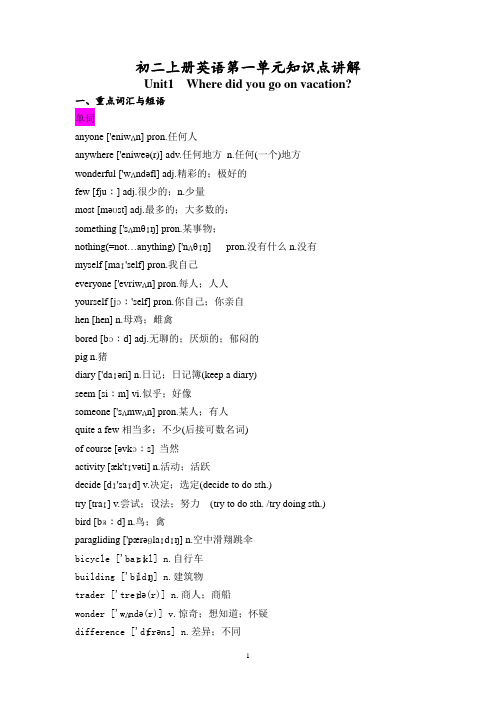
初二上册英语第一单元知识点讲解Unit1 Where did you go on vacation?一、重点词汇与短语单词anyone ['eniwʌn] pron.任何人anywhere ['eniweə(r)] adv.任何地方n.任何(一个)地方wonderful ['wʌndəfl] adj.精彩的;极好的few [fjuː] adj.很少的;n.少量most [məʊst] adj.最多的;大多数的;something ['sʌmθɪŋ] pron.某事物;nothing(=not…anything) ['nʌθɪŋ] pron.没有什么n.没有myself [maɪ'self] pron.我自己everyone ['evriwʌn] pron.每人;人人yourself [jɔː'self] pron.你自己;你亲自hen [hen] n.母鸡;雌禽bored [bɔːd] adj.无聊的;厌烦的;郁闷的pig n.猪diary ['daɪəri] n.日记;日记簿(keep a diary)seem [siːm] vi.似乎;好像someone ['sʌmwʌn] pron.某人;有人quite a few相当多;不少(后接可数名词)of course [əvkɔːs] 当然activity [æk'tɪvəti] n.活动;活跃decide [dɪ'saɪd] v.决定;选定(decide to do sth.)try [traɪ] v.尝试;设法;努力(try to do sth. /try doing sth.)bird [bɜːd] n.鸟;禽paragliding ['pærəɡlaɪdɪŋ] n.空中滑翔跳伞bicycle ['baɪsɪkl] n.自行车building ['bɪldɪŋ] n.建筑物trader ['treɪdə(r)] n.商人;商船wonder ['wʌndə(r)] v.惊奇;想知道;怀疑difference ['dɪfrəns] n.差异;不同top [tɒp] n.顶部;顶wait [weɪt] v.等;等待(wait for)umbrella [ʌm'brelə] n.伞;雨伞wet [wet] adj.湿的;雨天的below [bɪ'ləʊ] prep.低于;在...下面adv.在下面as [əz] conj.如同;像...一样enough [ɪ'nʌf] adj.足够的adv.足够地;充分地duck [dʌk] n.鸭肉;鸭hungry(反full) ['hʌŋɡri] adj.饥饿的;渴望的feel like(doing sth.)想要dislike [dɪs'laɪk] v.不喜欢;厌恶 n.不喜爱;厌恶;反感一、短语:1. go on vacation去度假2.stay at home 待在家里3.go to the mountains 去爬山4. go to the beach 去海滩5. visit museums 参观博物馆6. go to summer camp 去参加夏令营7.quite a few 相当多(只修饰可数名词)8.study for 为……而学习9.go out 出去10.most of the time 大部分时间11. taste good 尝起来很好吃12.have a good time 玩得高兴13. of course 当然14.feel like 给……的感觉;感受到15.go shopping 去购物16.in the past 在过去17. walk around 四处走走18. because of 因为19. one bowl of… 一碗…… 20. the next day 第二天21. drink tea 喝茶22. find out 找出;查明23. go on 继续24.take photos 照相25. something important 重要的事26. up and down 上上下下27. come up 出来28. buy sth. for sb. / buy sb. sth. 为某人买某物29. taste + adj. 尝起来…… 30. look+adj. 看起来……31.nothing…but+动词原形除了……之外什么都没有32.seem+(to be)+ adj. 看起来……33. arrive in+大地点/ arrive at+小地点到达某地34.decide to do sth. 决定去做某事35. try doing sth. 尝试做某事/36. try to do sth. 尽力去做某事37. forget doing sth. 忘记做过某事/38. forget to do sth. 忘记做某事39. enjoy doing sth. 喜欢做某事40. want to do sth. 想去做某事41. start doing sth. 开始做某事42. stop doing sth. 停止做某事43. dislike doing sth.不喜欢做某事44. keep doing sth. 继续做某事45. Why not do. sth.? 为什么不做……呢?46. so+adj.+that+从句如此……以至于……47. tell sb. (not) to do sth. 告诉某人(不要)做某事48 .have a good time=enjoy oneself=have fun(doing sth.)玩得痛快二、句型1、buy sth. for sb. = buy sb. sth.为某人买某物2、taste + adj. 尝起来…… look+adj. 看起来……3、nothing…but+动词原形除了……之外什么都没有4、seem+(to be)+ adj. 看起来……5、arrive in+大地点(如国家、省份、城市等)/ arrive at+小地点(如学校、商店、车站等)到达某地get to+地点/reach+地点到达某地6、decide to do sth.决定去做某事7、try doing sth.尝试做某事(强调抱着试试看的心态尝试某件事是否行得通)/ try to do sth(强调付出努力并设法去完成).尽力去做某事8、forget doing sth.忘记做过某事/ forget to do sth.忘记做某事9、enjoy doing sth.喜欢做某事10、want to do sth.想去做某事want sb to do sth11、start doing sth.开始做某事12、stop doing sth. 停止做某事13、dislike doing sth. 不喜欢做某事14、keep doing sth.继续做某事keep on doing sth 不停做某事15、. Why not do. sth.=Why don’t you do sth? 为什么不做……呢?16、so+adj.+that+从句如此……以至于……17、tell sb. (not) to do sth. 告诉某人(不要)做某事18、enough+名词:足够的;充足的;从分的;形容词+ enough:足够地;充足地;从分地19、not really:真的没有20、seem to do sth 似乎好像做某事21、Bye for now!到这该说再见了!22、.have a good time=enjoy oneself=have fun(doing sth.)玩得痛快keep sth+adj.使…保持…状态feel like +n./v.ing sth 想要……;想要做……三、重点句子1. Where did you go on vacation? 你去哪儿度假的?1)这是一个由疑问副词where引导的特殊疑问句。
八年级英语上册Unit1Wheredidyougoonvacation单元语法课件新版人教新目标版1

Unit 1 Where did you go on vacation?
单元语法清
语法精讲
复合不定代词
1.概念 : 不明确指代某个人、某个事物、某些人、某些事物的代词叫不定代词。
由some , any , every , no与one , thing等构成的代词称为复合不定代词。
定语。 eg : There is someone in the room.房间里有人。 I don't have anything to say today.我今天没有什么可说的。
Money isn't everything.金钱不是一切。 ②复合不定代词在句中作主语时 , 谓语动词常用单数形式。 eg : Someone is waiting for you at the school gate , Jim.吉姆 , 有人在
有什么有趣的事情吗 ?
④some不定代词通常用于肯定句中 ; any不定代词那么多用于否定句或疑问句中。 但在表示请求、建议、反问等的疑问句中 , 或问话者希望得到肯定答复时 , 常
用含有some的不定代词 , 如something , someone等。 eg : Would you like something to drink , sir ?先生 , 你想喝些什么东西
复合不定代词 something anything everything nothing
含义 某事;某物 任何事物 所有事物;一切 没有什么
复合不定代词 someone anyone everyone no one
含义 某人 任何人 每人;所有人 没有人
人教新目标八年级上册英语《Unit 1 Where did you go on vacation?》

人教新目标八年级上册英语《Unit 1 Where did you go on vacation?》Section B_教学设计2一. 教材分析人教新目标八年级上册英语《Unit 1 Where did you go on vacation?》Section B 主要包括两部分内容:一是听力练习,二是口语交际。
通过本节课的学习,学生能够掌握一般过去时的疑问句和回答,学会用英语询问他人的假期经历,并能用一般过去时进行回答。
教材内容丰富,贴近学生生活,有利于激发学生的学习兴趣。
二. 学情分析八年级的学生已经掌握了部分英语语法知识,具备一定的听说读写能力。
但学生在使用一般过去时方面还存在困难,需要通过大量的练习来巩固。
此外,学生对于描述自己和他人的假期经历可能感到无从下手,需要教师在课堂上进行引导和鼓励。
三. 教学目标1.知识目标:学生能够掌握一般过去时的疑问句和回答,学会用英语询问他人的假期经历,并能用一般过去时进行回答。
2.能力目标:学生能够听懂、会说、会写本节课的重点词汇和句型。
3.情感目标:通过本节课的学习,学生能够增进与同学之间的友谊,分享彼此的假期经历。
四. 教学重难点1.重点:一般过去时的疑问句和回答,以及本节课的重点词汇和句型。
2.难点:如何运用一般过去时描述自己和他人的假期经历。
五. 教学方法1.任务型教学法:通过设置各种任务,让学生在完成任务的过程中学会运用所学知识。
2.交际法:鼓励学生进行口语交流,提高学生的交际能力。
3.情境教学法:创设各种情境,让学生在真实的环境中学会使用英语。
六. 教学准备1.教师准备:准备好课件、听力材料、相关图片等教学资源。
2.学生准备:预习本节课的内容,准备好相关的词汇和句型。
七. 教学过程1.导入(5分钟)教师通过提问学生“What did you do last weekend?”引出本节课的主题“假期经历”。
引导学生用英语表达自己的假期经历,激发学生的学习兴趣。
人教新目标八年级上册英语《Unit 1 Where did you go on vacation?》

人教新目标八年级上册英语《Unit 1 Where did you go on vacation?》Section A_教学设计2一. 教材分析人教新目标八年级上册英语《Unit 1 Where did you go on vacation?》Section A,主要讲述了假期旅游的话题。
本节课通过引入 vacation 这一主题,让学生学会询问他人假期去哪里旅游以及如何描述自己的假期经历。
教材内容丰富,插图生动,有助于激发学生的学习兴趣,提高他们的语言运用能力。
二. 学情分析八年级的学生已经掌握了基本的英语语法和词汇,具备一定的听说读写能力。
但他们在实际运用英语进行交流时,还存在着一定的困难。
因此,在教学过程中,教师需要关注学生的个体差异,创设真实、有趣的语言环境,让他们在实践中提高英语水平。
三. 教学目标1.知识目标:让学生掌握 vacation 相关词汇,学会询问他人假期去哪里旅游以及如何描述自己的假期经历。
2.能力目标:提高学生的听说读写能力,使他们能够在实际情境中运用英语进行交流。
3.情感目标:培养学生对旅游的兴趣,增强他们的生活体验。
四. 教学重难点1.重点:掌握 vacation 相关词汇,学会询问他人假期去哪里旅游以及如何描述自己的假期经历。
2.难点:运用英语进行实际交流,提高语言运用能力。
五. 教学方法1.任务型教学法:通过完成各种任务,让学生在实践中学习英语,提高他们的语言运用能力。
2.情境教学法:创设真实、有趣的语言环境,激发学生的学习兴趣。
3.交际教学法:鼓励学生积极参与课堂交流,提高他们的听说能力。
六. 教学准备1.准备相关旅游图片、视频等教学资源。
2.设计各种任务,如小组讨论、角色扮演等。
3.准备听力材料,让学生练习听力。
七. 教学过程1.导入(5分钟)利用图片、视频等教学资源,引入 vacation 这一主题,激发学生的学习兴趣。
2.呈现(5分钟)展示 vacation 相关词汇,如 beach, mountn, temple 等,并解释它们的意思。
人教新目标版英语八上Unit 1《Where did you go on vacation》word
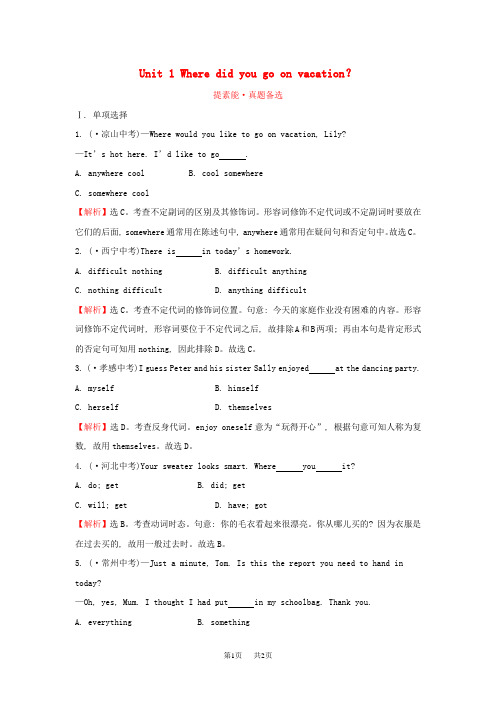
Unit 1 Where did you go on vacation?提素能·真题备选Ⅰ. 单项选择1. (·凉山中考)—Where would you like to go on vacation, Lily?—It’s hot here. I’d like to go.A. anywhere coolB. cool somewhereC. somewhere cool【解析】选C。
考查不定副词的区别及其修饰词。
形容词修饰不定代词或不定副词时要放在它们的后面, somewhere通常用在陈述句中, anywhere通常用在疑问句和否定句中。
故选C。
2. (·西宁中考)There is in today’s homework.A. difficult nothingB. difficult anythingC. nothing difficultD. anything difficult【解析】选C。
考查不定代词的修饰词位置。
句意: 今天的家庭作业没有困难的内容。
形容词修饰不定代词时, 形容词要位于不定代词之后, 故排除A和B两项; 再由本句是肯定形式的否定句可知用nothing, 因此排除D。
故选C。
3. (·孝感中考)I guess Peter and his sister Sally enjoyed at the dancing party.A. myselfB. himselfC. herselfD. themselves【解析】选D。
考查反身代词。
enjoy oneself意为“玩得开心”, 根据句意可知人称为复数, 故用themselves。
故选D。
4. (·河北中考)Your sweater looks smart. Where you it?A. do; getB. did; getC. will; getD. have; got【解析】选B。
- 1、下载文档前请自行甄别文档内容的完整性,平台不提供额外的编辑、内容补充、找答案等附加服务。
- 2、"仅部分预览"的文档,不可在线预览部分如存在完整性等问题,可反馈申请退款(可完整预览的文档不适用该条件!)。
- 3、如文档侵犯您的权益,请联系客服反馈,我们会尽快为您处理(人工客服工作时间:9:00-18:30)。
Unit 1 Where did you go on vacation
教学目标:
一、知识目标
Wo rds and expressions:
(1) anyone anywhere wonderful few quite a f ew m ost
something nothing everyone of course myself yourself
h en pig seem bored someone diary
(2)go on vacation buy something special quite a few
of course
(3) Where did you go on vacation?
Did you go out with anyone?
能力目标:掌握一些规则动词和不规则动词的过去式.
掌握否定代词的用法.
三|情感目标:通过讨论假期,增进学生对国内外风景名胜的认识,热爱大自然,形成积极向
上的生活观.
语法难点:时间表达法
教学过程:不定代词的用法.
Step1 Talk about the students’vacation.
Where did you go on vacation?
Did you have a good t ime?
Step 2 Learn new words.
St ep3. Presentation Learn the following sentences by PPT:
Where did you go on vacation?
Did you go out with anyone?
Did yo u buy anything special?
How was the food?
Did everyone have a good time?
Step4: Listen to 1b and math the activities with t he pictures..
First let the Ss listen carefully..
Then check the answers.
Step5: Listen and number the people in the pictur e.
Step6: Listening 2a and compl ete the chart..
1.Step7:Listening again . Ch eck Yes or No f or ea ch que stion. Finish 2b. Step8: 2d Role-play the conversation.
Step 9: Test 完成单词
1.---Lisa, did you go a __________ last weekend?
---Yes, I went to Hangzhou with my sister.
2.I bought something for my friends, but n________ for myself.
3.My d aughte r usually keeps a d_______ every day.
4.The movie isn’t interesting at all, so I feel b_______ about it.
5.There are f________ students in the classroom. They are all havin g a P.E.
class on the playgro und.
教学后记:。
